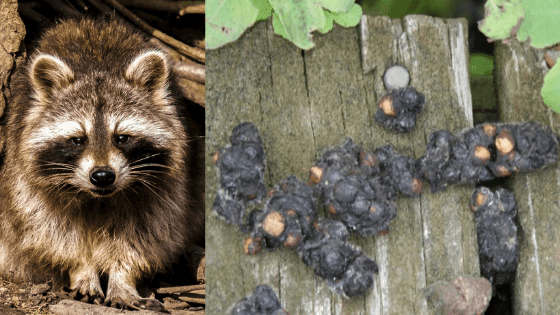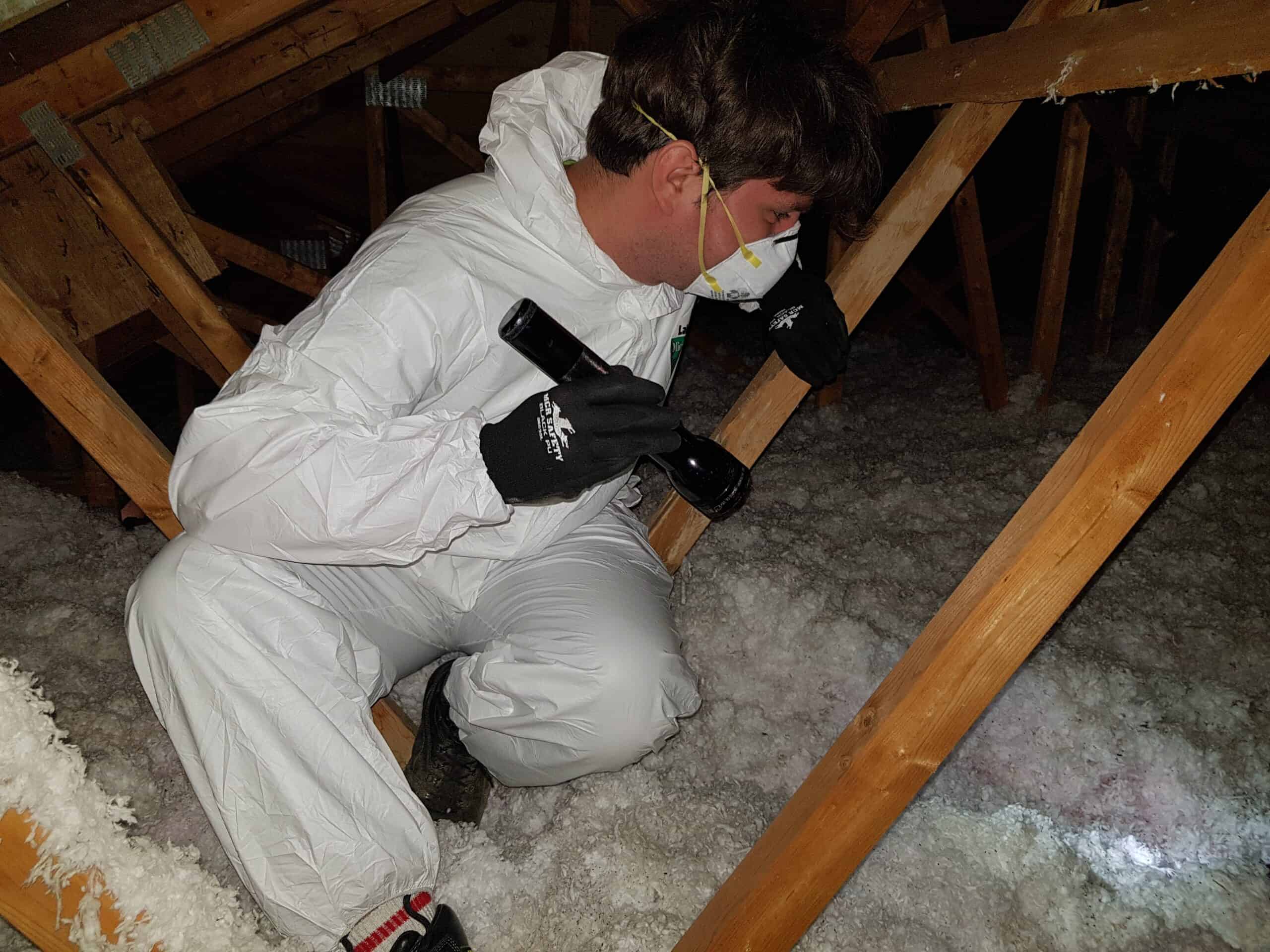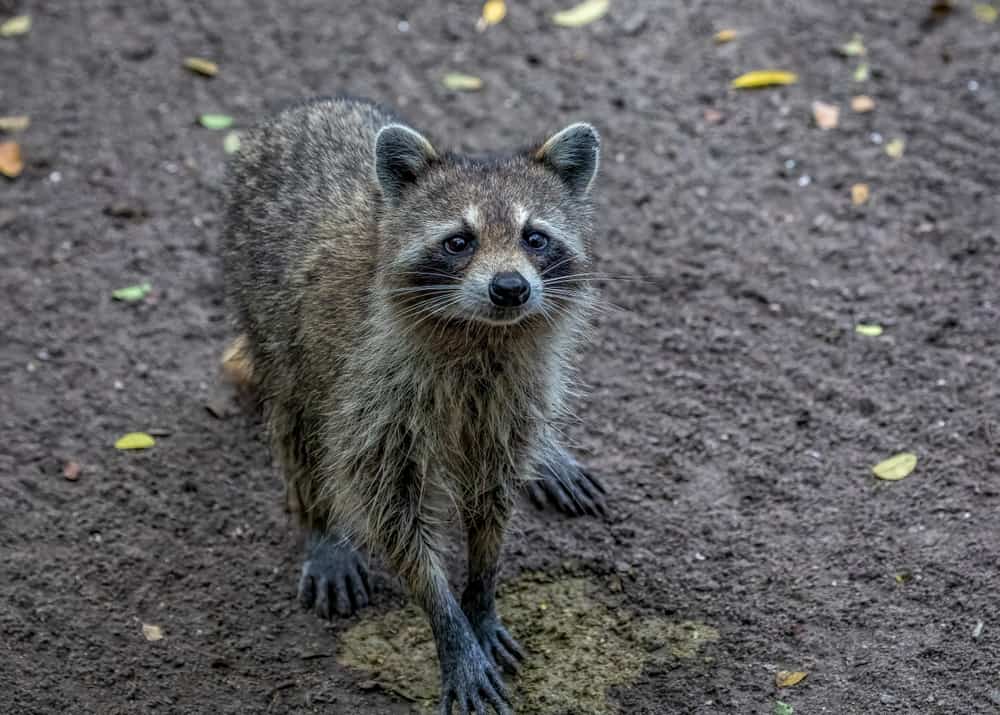Raccoons might be cute and adorably nicknamed “trash pandas,” but they are not the type of pets you want to have in your home. In fact, having raccoons anywhere near your property can be a major problem.
In most cases, the first sign of a raccoon’s presence isn’t actually seeing them. It’s seeing raccoon feces in your yard. If you are worried about raccoon droppings in your attics or backyard, we’ll explain everything you need to know and how to handle it.
What do raccoon droppings look like?
Raccoon poop looks long and cylindrical, almost like a dog’s or a cat’s poop. It tends to have a very foul, pungent odor. If raccoons in your area eat a lot of berries, you may also see berry seeds in the poop.
Due to the presence of potential parasites that may be present in raccoon poop, you may also see worms or things that look like grains of rice sticking out of the feces.
Where do raccoons poop?
Raccoons are “communal poopers,” which means that a whole raccoon nest will often use a single place to poop. This is known as a raccoon latrine. The latrine area is usually on a flat surface like a log, a deck, a shelf, or at the base of a tree.
If you have the misfortune of having a raccoon family in your home, you’ll find raccoon excrement in attics, garages, or in basements. You may also smell raccoon urine before you see any feces.
Is raccoon poop dangerous?
Yes, it is. The Center for Disease Control notes that raccoon poop can be a carrier of roundworms, which can infect both people and pets. In some cases, raccoon feces can also carry dangerous bacteria and viruses.
Much like handling rat poop or squirrel poop, you should always street raccoon poop like contaminated material.
What should you do if you find raccoon poop on your property?

The first thing you should do is clean up the raccoon poop. Raccoon poop is a health hazard, so it may make sense to call a professional cleanup crew along with an exterminator. (Seriously, you don’t want raccoons too close!)
Another thing you should do is call an exterminator or prevent raccoons from entering your home. You should secure trash cans, avoid leaving composting vegetables outside, and also make your home unfriendly towards wildlife.
Does finding raccoon poop mean I have a raccoon problem?
We hate to be the bearers of bad news, but in many cases, it can mean that you have a raccoon problem. If the raccoon latrine is outdoors near your home, by the woods, then you might be safe. Just, you know, secure your trash cans and don’t leave food outside.
On the other hand, if you found raccoon poop on your deck or inside your home, you have a problem. This means that you have a family of raccoons somewhere nearby and possibly inside your house.
Raccoons may be cute, but they are not fun to live near. Much like mice or rats, raccoons are famous for carrying diseases that can be lethal to both humans and pets alike. Most alarmingly, they can carry rabies.
How do I clean up raccoon feces on my own?

Raccoon feces is considered to be a biohazard, so this isn’t going to be as easy as scooping up your pet’s poop. You are going to have to treat it differently. Let’s explain how:
- First, wear protective gear. You will need a pair of rubber gloves, boot coveralls, eye protection, and a respirator. The bacteria in raccoon poop is no joke. Make sure you don’t have any open wounds that would allow bacteria to get into your body.
- Spritz the poop with water and place the poop in a plastic bag. Tie the bag up. Use a spray bottle to mist the area so that dust doesn’t kick up. Some groups also suggest using a bucket. The water helps ensure that no aerosolized poop gets inhaled.
- Use a sponge and detergent to wipe down the area. This is done to clean up any remnants of urine that raccoons may have used to mark the area as their communal toilet.
- Then, heat treats the area with boiling hot water or the heat of a propane torch. Do not skip this step. Most raccoons have roundworms, and these can be dangerous to the human body. Roundworms can survive standard detergent, but they cannot survive the heat.
- Dispose of the raccoon poop by placing it in multiple trash bags. Some guidelines also suggest burning the material, but that can smell.
- Wash your hands with soapy water. You can never be too careful. Use antibacterial soap.
What should you do after you’ve cleaned up the poop?
Raccoons are generally not something you want to have around your home, especially if you leave pets outside. However, if you live in a heavily wooded area, this may not be that big a deal. Here’s what you should do…
1. Start to find ways to keep raccoons out of your yard.
There are a couple of ways you can help prevent raccoons from coming back once you have removed their latrine. The easiest way to decrease the chances of them dropping by is to install a fence that’s difficult to climb, though this is not a surefire way.
Better options include the following:
- Remove forest debris from your yard. This can include things like fallen logs, stumps, piles of leaves, large rocks, and tall grass.
- Plant plants that repel raccoons. Raccoons can tolerate almost any type of plant except for thorny ones. Cucumber, spiky squash, and thistle are good options. Raccoons also dislike spicy plants like pepper and strongly-smelling plants like garlic.
- Lock your trash cans. They don’t get their nickname of “trash panda” for no reason. Raccoons love to pilfer trash from garbage cans. Removing access to this food source can make them go away altogether. Make sure to double bag your trash, too. Raccoons can be persistent!
- Stop leaving cat food and dog food outside for your pets. Raccoons take to this like a fly to honey. If you leave food out for stray cats, it may be time to either let the cats inside or get a humane trap so that they can find a home.
- Spray raccoon repellent nearby. Some companies offer chemicals that smell like predators of raccoons. This can make it easier for you to keep them away. If you don’t want to go for the chemical route, there are also electronic devices said to repel them.
- Make sure that the area underneath your patio is sectioned off and fenced off. If you notice a gap where raccoons can get in, fill the area with dirt using a shovel or use a lattice fence to section it off.
2. If the raccoons made it inside your home call an exterminator immediately.
A raccoon can cause serious damage to your home’s interior and also a fence risk to anyone living inside of it. You need professional help to make sure that they get out of your home as soon as possible.
The exterminator will also survey the area to see how they got in. If there is damage they can see or an entryway that they use, you may need to call a contractor to seal it off. You don’t want these critters to come back!
3. Call your local wildlife administration or animal control if things look dire.
If you notice that the raccoon population in your area is skyrocketing, call them. The same can be said if you notice that the raccoon is acting strange or trying to approach you during the daytime. That could be a sign of rabies.
Some areas also have advisories when it comes to wildlife. If your town or county has an issue with raccoons, call the municipal office to report a sighting. This can help them cut down wildlife that may carry diseases.
4. Exercise extreme caution when bringing pets outside.
We all know that dogs need to “go” outside, and when there’s the chance of raccoon poop being near, that’s bad news. Dogs and cats are both highly susceptible to roundworm, so take precautions regarding this risk.
Give your pets roundworm prevention medicine until the raccoons migrate away. Oh, and make sure to never leave them unsupervised in the back yard if you know there are raccoons nearby. It could be a lethal mistake!
Conclusion
Raccoon poop is a sign of something worse. Remember that! While they may be adorable, they are harbringers of disease and cause serious damage to your home. So, pick up the poop, and invest in some methods to prevent those critters from coming back. It’s the smart thing to do.
